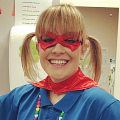Helping Manchester Clinical Research Facility’s young patients to be part of research
This week we have been celebrating International Clinical Trials Day. Here, Emma Harrison, Research Health Play Specialist shares how through her unique role she is providing invaluable support to help our NIHR Manchester Clinical Research Facility (CRF) patients and their families to #BePartofResearch.
Emma the toy lady
Our young CRF patients fondly refer to me as Emma the “toy lady.” You’re probably wondering, “What is a toy lady?” “How can I get that job?” A toy lady is an age appropriate term used to describe my role as a Health Play Specialist, and is a title affectionately given to me by one of my long term patients (Alex, at aged 8).
After qualifying with a Level 3, NNEB Cache Diploma in Childcare aged 18 I worked as a nanny for many years. At 28 a friend introduced me to the role of the Health Play Specialist and I quickly realised this was the career path I wanted to take. The skills I’d acquired through my initial training/work as a nanny were transferable and would allow me to apply for the Healthcare Play Specialism Foundation Degree course. Two years later I qualified and applied for the post of Health Play Specialist in Research, the rest is as they say, is history…
I’ve been working at Manchester CRF at Royal Manchester Children’s Hospital (RMCH) for five years. Each and every day is diverse, fulfilling and rewarding and it’s a privilege to be involved in the important work carried out here. We’re so appreciative of our patients, who by being part of research are volunteering to receive any treatments and procedures that need to be carried out as part of a study. Therefore, I work alongside the Multi-Disciplinary Team of research nurses, consultants, psychologists and others to try to ensure that any clinical interventions provide the children with a positive experience. Having this positive experience in a clinical environment will help us to retain them on our trials and help our patients in the future should they need any clinical treatments in other settings.

A warm welcome
One of my core responsibilities as a Research Health Play Specialist is to present a friendly, welcoming environment for children, young people and their families. I’ve created a number of colourful displays throughout the ward area and developed a photo wall of our patients. This offers a personal touch and gives the children a sense of ownership over the ward area where they voluntarily spend a lot of their time.
Over time I’ve developed appropriate professional relationships with both the patients and their families, based on how regularly we see one another. This enables me to plan and prepare suitable activities for each individual, meeting their own specific needs both developmentally and physically. Some of our children and young people may also present with complex health needs. It’s my job to provide a safe, normalised environment for the patients, enabling them to take part in general play, planned activities and sensory sessions. This includes planning outdoor sessions for my patients on the roof top garden which provides a change of environment and an opportunity to leave the ward area.
Distraction therapy
Distraction/diversional therapies are provided for children and young people to help alleviate anxieties for all treatments and procedures including phobias of hospitals, needles or any clinical interventions. Through the use of therapeutic and specialised play, our aim is to help patients cope with pain, and divert their attention away from what is happening. I provide coping mechanisms to reduce any emotional intensity they may feel around taking part in procedures and allow them to express their feelings through play interaction with a non-clinical member of the team.

Crucially, I act as a non-medical advocate for my patients, explaining treatments and procedures in an age appropriate language. I can influence the whole visit to ensure all the children’s needs are communicated to, and met by the rest of the team. This may involve allocating particular bed spaces and playing an integral role in nurse allocation for patients who benefit from routine and familiarity.
For parents, voluntary involvement in research; being with their children undergoing clinical interventions (to seek a new treatment for their condition or to help others in the future) is a different emotional situation than knowing their children are there as a clinical necessity. I will support parents who may experience their own feelings of anxiety and fear surrounding their child’s visit.
What it means to me
If I told you that every morning I skip into work with a big smile on my face I wouldn’t be lying… Working as part of this team and developing close therapeutic relationships with the children, young people and their families, over long periods of time, is such a privilege. My main focus for each and every patient visit is to provide the children and young people with a fun, appealing environment they want to return to. Being able to facilitate a positive hospital experience and enabling families to be part of research is paramount. I love spending quality time with the children and seeing them benefit from their participation in a clinical trial. Seeing our patients arriving on the CRF wearing a big smile, full of enthusiasm for spending time on the ward is priceless…
The children in our peanut desensitisation study don’t enjoy the blood tests and peanut challenges. However, Emma’s masterful play engagement changes their outlook on what the scheduled visits are about. A number of them say they come to play with Emma and will head straight into the play room.
The toys are still there on the days Emma isn’t. However, it’s not the toys in the play room but, the emotional intelligence that Emma invests in each individual participant that I think makes them so co-operative, and happy to take part.
Vibha Sharma – Principal Investigator, PALISADE (peanut allergy) study





